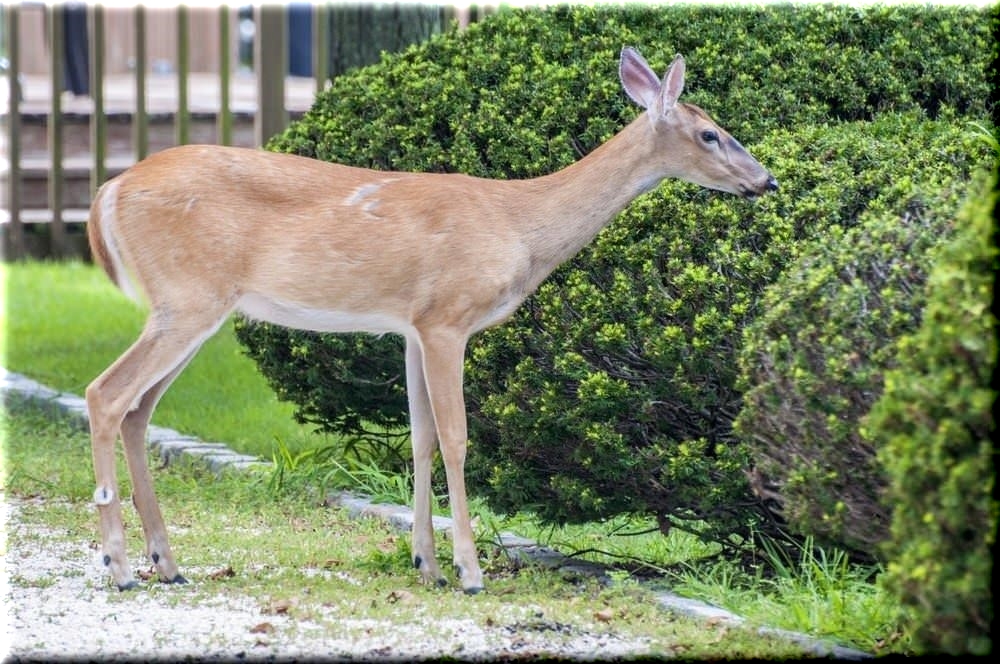Garden
How to Keep Deer Out of Your Garden: Effective Methods for Deterrence
Deer are beautiful creatures, but they can be a real nuisance for gardeners. If you’re dealing with deer in your garden, you know how frustrating it can be to watch your hard work disappear overnight. But don’t despair! There are many effective ways to deter deer and keep your garden safe.
Effective Methods to Deter Deer from Your Garden
Understanding deer behavior is key to creating a deer-resistant landscape. Deer are attracted to certain plants and avoid others due to their sense of smell and taste. They are also influenced by factors like food availability, their natural instincts, and the presence of predators.
Fencing
One of the most effective ways to keep deer out of your garden is to build a fence. Deer are agile jumpers, so you’ll need a fence that’s at least 8 feet tall. A solid fence, like a stockade fence, is the best choice because deer are hesitant to jump over a fence if they can’t see what’s on the other side.
You can also use other materials for fencing, like vinyl, wire mesh, or even a combination of materials. Choosing the right fencing material depends on your budget, aesthetics, and the severity of the deer problem.
Repellents
Deer repellents work by using a combination of scent and taste to deter deer from eating your plants. Commercial sprays are available, containing ingredients like garlic, pepper, and other natural deterrents.
You can also create your own homemade repellents using readily available ingredients. These often include strong-smelling substances like garlic, hot pepper sauce, eggs, or even human hair. However, homemade repellents need to be reapplied frequently, especially after rain or wind.
Deer-Resistant Plants
Choosing plants that are naturally deer-resistant can help reduce the temptation for deer to browse in your garden. These plants typically have strong scents, prickly textures, or bitter flavors. Examples of deer-resistant plants include lavender, rosemary, foxglove, yarrow, and ferns.
By choosing a variety of these plants, you can create a garden that is less appealing to deer.
Motion Sensors and Other Devices
Motion-activated sprinklers and sound devices can be used to deter deer by startling them. These devices use sensors to detect movement and react with a burst of water or a loud noise. While effective in some situations, they may not be a solution for every deer problem, especially if the deer become accustomed to the sounds and water.
Other Protective Measures
In addition to fencing and repellents, there are other protective measures you can use to deter deer. For example, you can use netting or row covers to protect specific plants, such as vegetables or young seedlings.
You can also create physical barriers around your garden beds with materials like gravel or mulch. Deer are less likely to walk through these materials, which can deter them from reaching your plants.
Creating a Deer-Resistant Landscape
The best approach to keeping deer out of your garden is to create a landscape that is less appealing to them in the first place. This means choosing plants they don’t like, creating visual barriers, and using other deterrents.
Designing a Garden with Deer in Mind
When choosing plants, consider their scent, taste, and texture. Deer often avoid plants with strong scents, like lavender or rosemary. They also tend to dislike prickly plants, like holly or barberry.
Combining Methods for Comprehensive Protection
The most effective way to deter deer is to use a combination of methods. A fence alone may not be enough, especially if deer are determined to get to your garden. Combining fencing with repellents, deer-resistant plants, and other protective measures can provide a multi-layered defense.
Long-Term Solutions
Keeping deer out of your garden requires a long-term approach. Regularly inspect your fence for any damage or gaps. Reapply repellents as needed, especially after rain or wind. Monitor deer activity and adjust your strategy accordingly.
Frequently Asked Questions About Keeping Deer Out of Gardens
What are the most common deer-resistant plants?
Lavender, rosemary, foxglove, yarrow, and ferns are just a few examples of deer-resistant plants.
How do I choose the right deer fence?
Consider the height, material, and design based on your needs. A fence at least 8 feet tall and made of a solid material is the most effective.
What is the best type of deer repellent?
This depends on your garden and the deer population. Commercial sprays are generally effective but may need to be reapplied frequently. Homemade repellents can be a more cost-effective option but may require more frequent applications.
Are there any natural ways to deter deer?
Yes, using strong-smelling herbs, placing human hair around your garden, or creating visual barriers with reflective objects can be effective natural deer deterrents.
How often do I need to apply repellents?
It’s recommended to reapply them after rain or heavy wind, and consistently during the seasons when deer are most active.
Conclusion
Keeping deer out of your garden requires a combination of strategies. It may take some experimentation to find the right combination of methods that work for your garden, but with a little effort, you can enjoy your beautiful garden without worry.
Do you have any tips for keeping deer out of your garden? Share your experience in the comments below!


